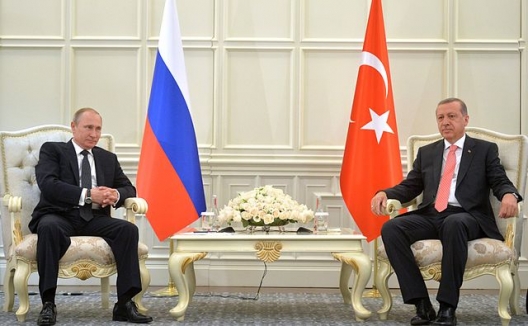 In Syria, the danger of a war between Turkey and Russia is on the rise ….
In Syria, the danger of a war between Turkey and Russia is on the rise ….
Syria is the Cuba of 2016 and the risk of an international confrontation there is growing by the day. For five years now, the country has been engaged in a brutal civil war, but the conflict could now develop into a larger clash between Russia and the West. Moscow and NATO member state Turkey are squaring off in the Syrian conflict, and the potential consequences for the trans-Atlantic alliance are impossible to predict.
Officials in Angela Merkel’s Chancellery in Berlin are concerned about how close NATO has already come to a conflict with Russia. Indeed, Syria could become a vital test case for the military alliance. But the situation is complex: In order to thwart Putin, NATO must make it clear that it stands behind its member states in their moment of need. Yet NATO also wants to avoid a military conflict with Russia at all costs.
Officials at NATO headquarters in Brussels view the situation between Ankara and Moscow as being extremely volatile. “The armed forces of the two states are both active in fierce fighting on the Turkish-Syrian border, in some cases just a few kilometers from each other,” one NATO official says….
German Chancellor Merkel is concerned that Putin is doing what he can to provoke Turkey as a way to test NATO. Which is why the German chancellor wants to do all she can to prevent Ankara from realizing its threat to send ground troops into Turkey. “That would likely be tantamount to doing Russia a favor,” says one Chancellery official.
Putin’s aim, the official says, is that of driving a wedge into NATO and destabilizing the alliance. A military federation that openly debates whether or not to support one of its members would quickly lose its credibility — and that would be a significant triumph for Putin, the official says.
Russia has shown no signs of letting up, either. At the end of January, Turkey reported that a Russian jet had once again violated its airspace. It’s a pattern that NATO is familiar with from the Baltic countries, where Russia likewise engaged in a series of pinprick provocations. In Berlin, officials have begun talking of “Putin’s hybrid war against Turkey.”
One element in that conflict is the economic sanctions that Putin slapped on Ankara after the Russian jet was shot down. That is also when he began supporting the Kurds. “That is Turkey’s Achilles heel,” says Moscow military analyst Vladislav Shurygin. “By helping the Kurds, we unsettle Turkey to such a degree that it can think of nothing else.…”
In an effort to prevent further escalation, NATO has made it exceedingly clear to the Turkish government that it cannot count on alliance support should the conflict with Russia head up as a result of a Turkish attack. “NATO cannot allow itself to be pulled into a military escalation with Russia as a result of the recent tensions between Russia and Turkey,” says Luxembourg Foreign Minister Jean Asselborn….
“We are not going to pay the price for a war started by the Turks,” says a German diplomat. Because decisions taken by the North Atlantic Council, NATO’s primary decision-making body, must always be unanimous, it is enough for a single country to exercise its veto rights, the official says. But, the official adds, it won’t get that far: there is widespread agreement with the US and most other allies that Turkey would get the cold shoulder in such a case.
Nevertheless, NATO alliance members are monitoring the Turkish-Russian confrontation with concern. There is, after all, always the risk that Russia at some point might attack Turkish positions on Turkish soil. “Were the Russians to carry out a retaliatory strike against Turkey, we would have a problem,” says a NATO official. In such a case, Turkey could very well invoke Article 5. Were the North Atlantic Council to fail to achieve unanimity, Putin would once again have split the West, the official says….
In the coming months, Berlin intends to do what it can to prevent the stationing of additional NATO troops or materiel in the alliance’s eastern member states. The German military is not prepared to send additional troops to the Baltic countries or to Poland….
From the perspective of power politics, officials in Berlin and elsewhere are willing to concede, Putin’s intervention in Syria has thus far been a great success. “It is masterful tradecraft,” a close Merkel advisor says admiringly. Russia, he says, not only stabilized the regime of its ally Assad, but has also done everything in its power to make the situation more difficult for the West….
Thus far, when addressing the need to tighten the maritime border in the Aegean, Turkey has talked a lot but done little. Which is why Merkel brought in NATO to patrol the border between Turkey and Greece. Officially, the alliance has been charged with providing surveillance and combatting migrant smugglers. In reality, though, the presence of the Standing NATO Maritime Group 2 is to increase pressure on Turkey by making it impossible for government officials to continue claiming they don’t know where on the coast the refugee boats were launching from.
With the German ship Bonn leading the way, the NATO fleet is to determine the starting points of refugee boats and the routes they take. The data will then be used to force the Turks to block off the launch points, say NATO officials. Ideally, the ships are to have real-time contact with Turkish coast guard vessels.
Image: Russian President Vladimir Putin and Turkish President Recep Tayyip Erdoğan, June 13, 2015 (photo: Office of the President of Russia)
